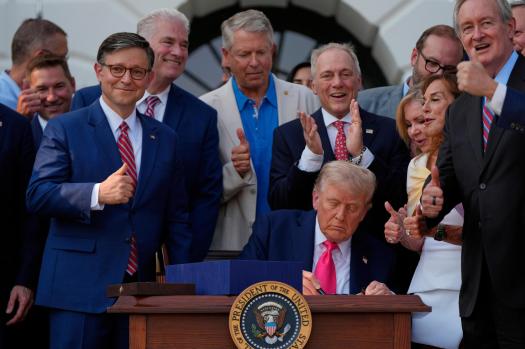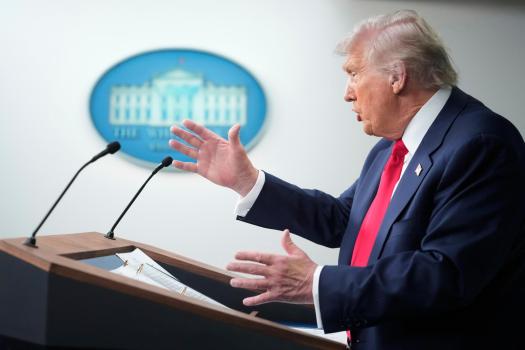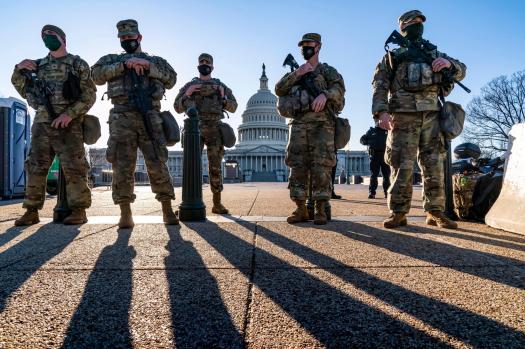By Associated Press Congressional Correspondent LISA MASCARO
Washington (AP) One of the greatest accomplishments of President Lyndon B. Johnson’s domestic legacy was the signing of legislation into law on this day in 1965 that established Medicaid, a health care safety net for millions of low-income Americans.
Using President John F. Kennedy’s first executive order for the creation of a positive food and nutrition program for all Americans, he had done the same for food stamps a year earlier.
President Donald Trump started chiseling them back this summer with a penstroke.
In addition to $4.5 trillion in tax relief for Americans, the Republican Party’s massive tax and spending measure brought about some of the biggest adjustments to the historic safety net programs in their history. Through the imposition of work requirements on recipients and the transfer of some federal costs to the states, the trade-off will reduce federal food assistance and health care spending by more than $1 trillion over a ten-year period.
Republicans in Congress are pursuing a long-held GOP objective of reducing the size of the federal government and the services it offers, even as they contend that the cuts are necessary to avert rising federal deficits and to rightsize the federal programs that have expanded over the decades.
In a recent podcast interview, House Speaker Mike Johnson stated, “We’re making the first changes to the welfare state in generations.”
With political repercussions to follow, the tax incentives and spending cuts package is ushering in a new era of uncertainty for the safety net services that millions of people in communities around the country have come to rely on.
According to polls, the majority of American adults do not believe that government expenditure on programs is excessive. According to a survey conducted by The Associated Press-NORC Center for Public Affairs Research, most Americans favor raising or preserving current levels of financing for well-known safety net programs like Social Security and Medicare.
Local governments are frantically trying to determine how they will adapt to the new environment, determining whether they will have to reduce aid to Americans, cut budgets elsewhere, or increase their own taxes to cover expenditures.
According to Sharon Parrott, president of the Center for Budget and Policy Priorities, a Washington-based research organization, the cuts are extremely harmful, extensive, and large.
According to her, millions of individuals will no longer have health insurance as a result. Food assistance is being lost for millions of people. And that ultimately leads to more misery and poverty.
In order to comply with the new standards, some recipients of aid—such as parents of teens and older Americans up to the age of 64—will need to get ready to work, take classes, or perform 80 hours of community service per month.
Overall, the nonpartisan Congressional Budget Office predicts that 10 million more individuals will become uninsured. There will be about 3 million fewer participants in SNAP, the Supplemental Nutritional Assistance Program.
According to Mark Ritacco, chief governmental affairs officer of the National Association of Counties, which convened its annual conference the week after Trump signed the bill into law, people are quite worried about what this implies for their financial well-being.
The group had urged senators to postpone the implementation dates of several Medicaid reforms, and it expects that more discussions with congressional members will stop some of these changes from ever happening. There were a lot of questions at its conference.
We are discussing SNAP and Medicaid. According to Ritacco, these are people’s life and means of subsistence.
As the adjustments stem from waste, fraud, and abuse, Republicans maintain that the bill is upholding Trump’s promise not to alter Medicaid. In a document, the House GOP’s campaign arm urges lawmakers to emphasize how well-liked its new work requirements and benefit limitations for specific immigrants are.
The House speaker stated on The Benny Show that those safety nets are intended for a select group of people, including the elderly, the disabled, and young, unmarried pregnant women.
He said that everyone joined the movement in the years following the passage of the Affordable Care Act, also known as Obamacare.
The speaker claimed that all of these young, physically fit men without dependents were riding the wagon.
As part of the Social Security Amendments of 1965, President Johnson created Medicaid and Medicare, the health care program for the elderly, with the intention of serving low-income families and those with disabilities.
Related Articles
-
Dissent emerges at Federal Reserve among Trump appointees, but a rate change remains unlikely
-
Texas Republicans propose new US House map with more winnable GOP seats
-
FDA vaccine chief leaving agency after less than 3 months
-
Trump, in another break from the norm, interviews 4-star general candidates
-
Trump announces 25% tariff on India and unspecified penalties for buying Russian oil
And it took off in a flash. By 1970, the KFF, a health policy group, reported that nearly all states had joined Medicaid. Pregnant women, school-age children, and people with incomes slightly above the federal poverty level—currently around $15,650 per year for an individual and $26,650 for a family of three—were soon included in addition to its core demographic.
Since President Barack Obama signed the Affordable Care Act into law, Medicaid has expanded significantly since the majority of states have chosen to participate in the federal expansion. It covers about 80 million adults and children.
The number of people without health insurance has decreased, but the annual cost to the federal government of providing Medicaid has increased to over $880 billion.
The most obvious impact Medicaid has on health is that it saves lives, according to Bruce D. Meyer, a professor of public policy and economics at the University of Chicago who co-authored a crucial study evaluating the program.
He claimed that while the law’s amendments will undoubtedly save the federal government a significant sum of money, they will also result in a significant rise in mortality. You must also choose what is most important to you.
Johnson signed the Food Stamp Act of 1964 into law, establishing food stamps as a government program. Previously available during the end of the Great Depression, food coupons were discontinued during World War II due to rationed supplies.
Approximately 40 million people nationally receive SNAP benefits, which amount to nearly $200 per person each month.
In an attempt to delay the bill, Democratic Leader Hakeem Jeffries gave the longest speech in House history, claiming that the amendments will negatively impact communities and households across the country.
Who are these individuals? “Jeffries said.” stealing Americans’ access to health care. the biggest Medicaid budget cutbacks in American history. stealing food from the mouths of veterans, elderly people, and children who will go hungry because of this one large, unsightly bill.











